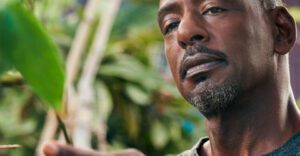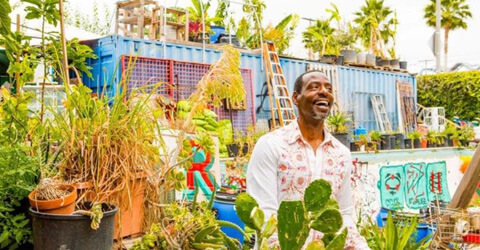Ron Finley is a Los Angeles-based former fashion designer, and fitness trainer turned Urban Gardener. Finley has taught a MasterClass series on this subject, and his Ted Talk on guerrilla gardening—where he’s grown gardens in abandoned alleyways and more—has almost 4 million views. Finley has now emerged as the ‘Gangsta Gardener’ of South Los Angeles.
Ron Finley was born and raised in South Central and grew up six miles from where he currently lives. His father passed away when he was young, and he was raised by his mother and her partner, whom he described as abusive and a ‘hustler.’
As a young boy, he used to mow his neighbours’ grass for extra cash; however, he started enjoying the art of gardening only once he was an adult. “A lot of what I’ve learnt I’ve learnt on my own. It’s taken longer, but the process is beautiful,” he says.
Prior to his success in gardening, Finley was a successful Fashion Designer and Fitness Trainer. However, his career trajectory changed in 2010 when he noticed a problem in his neighbourhood; the rising obesity rates in his community coupled with those often neglected dirt patches next to the streets.
South-Central L.A. had recorded higher obesity rates than more affluent neighbouring communities like Beverly Hills, Glendale, and Pasadena, which are only a few miles to its north, according to a 2011 study conducted by the Los Angeles County Department of Public Health. This health pandemic was fueled by the high consumption of junk food and the city’s lack of fresh fruits and vegetables. He wanted to add to the city’s beauty while also aiding the health of his community. To combat this, Finley decided to plant some vegetables in these dirt patches. He was soon cited for gardening without a permit by the apparent owners of those dirt patches: the City of Los Angeles. That eventually led to the horticulture revolution in the city!
Finley fought back and succeeded. He started a petition with fellow green activists and demanded the right to garden and grow food in his neighbourhood. The petition gained momentum, and ever since, Finley has embarked on his mission to grow fresh produce and educate others to do so. His masterclass explains the art of gardening with a fresh perspective that allows you to engage with every step of the process and find beauty and freedom in gardening.
Ten years down the line, Finley has created dozens of community gardens in dirt patches and unused spaces around the city. Finley has travelled widely talking about his work, including a Ted Talk watched by 3.5 million people.
“Gardening is the most therapeutic and defiant act you can do, especially in the inner city,” Finley says. “I’ve witnessed my garden become a tool for education, a tool for the transformation of my neighborhood.”
Finley believes that home gardens have the opportunity to transform more than just his block in South LA. An increase in self-sufficiency amongst individuals can also positively influence the social and political systems that fuel these self-defeating cycles of obesity in low-income neighbourhoods.
“Just think about even one percent of us starting to grow our own food,” Finley says. “Think how much money that would take out of the system, from healthcare to grocery stores. People growing their own food is dangerous [to the status quo].”
His number one tip to novice gardeners is indicative of his straight-talk approach: “Plant what you like to eat. Don’t plant no shit you don’t like.”
According to him, feeding yourself shouldn’t be special or celebrated; it’s a basic necessity that should be a requisite. Finley explains, “So what I want people to realize is that I’m not telling you to grow all your food. But imagine if you did it collectively. Your neighbor and the guy across the street and you got together and decided what to grow. You have the orange and pomegranate trees, and I’ve got the kale and rhubarb, and Sally has the lettuce and passion fruit or whatever.” It’s a simple strategy that could feed the entire planet without mass plantations and corporations making billions over fresh produce.
He recalled people passing off his passion for gardening as just a hobby. “People looked at my garden like ‘your little hobby’ or something, now people realize this is no damn hobby, this is life and death. This is our revolution,” said Finley.
The pandemic has shed some light on this issue and made people rethink their choices. People across the globe have realized that their health should be their main priority that can be safeguarded only by eating fresh fruits and vegetables and living a healthy lifestyle. Finley says, “With the pandemic, our values have shifted immensely. You can’t eat diamonds. I tell kids, ‘Nothing you buy gives you value. You have an intrinsic value just by being here. There’s Nothing more special than you are.’ That’s why we’ve got to make [gardening] sexy. We gotta get gangsta’ for Mother Nature. If you heal your mother, you heal yourself.”
He added, “governments must invest more in encouraging people to be self-sustaining. I don’t like to use ‘hope’, I like to use the word ‘opportunity’. To hell with hope. It’s not for hope to change it. It’s the opportunity to make shit happen. A lot of the governments and municipalities need to put money into this.”
In conclusion, Finley thinks we need to change our perspective and treasure our resources. He says, “We have to start looking at things as resources, not trash. When I look at a leaf I think money. I think I can make compost and sell or use that compost.” Food systems around the world are collapsing; being self-sufficient is the only solution to this dilemma that the world will soon have to tackle.








